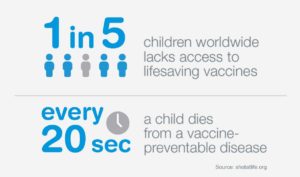By Giovanni Corrado || Contributing Writer

While western nations debate whether vaccines should be mandatory, the Global Health Observatory (GHO) estimated that one and a half million children die each year from diseases that could have been prevented via a vaccine. This is because one in five children in the world still lacks access to the basic childhood vaccines we take for granted here in the United States, according to the United Nations Foundation. This problem has a solution… so we must act!
Great strides have been made over the last decade to give more families access to immunizations for their children. A WHO report shows that the world is now 99% polio free with the disease endemic in just two countries: Pakistan and Afghanistan. We cannot stop now and lose the significant gains we have made. In addition to moral and humanitarian benefits, giving children around the world access to immunizations increases global and national security.
In today’s interconnected world, deadly diseases do not stop at borders as demonstrated by recent measles outbreaks and Ebola cases in the U.S. Immunizations are also a great financial investment. A study from the Johns Hopkins Bloomberg School of Public Health suggests that for every $1 spent on childhood immunizations, you get $44 in economic benefits. That includes saving the money that families lose when a child is sick and a parent cannot work. The United Nations Foundation’s Shot@Life campaign is asking U.S. legislators to help reduce vaccine-preventable childhood deaths around the world by providing adequate funding for global vaccine programs. This World Polio Day (October 24th), Call Congresswoman Ros-Lehtinen’s office and ask them to strengthen and prioritize funding for global vaccine programs through partners such as the United Nations, Gavi, the Vaccine Alliance, CDC, and USAID. We all have a stake in the outcome and parents around the world will sleep more soundly knowing their children are protected.
Junior Giovanni Corrado is a contributing writer. His email is gcorrado@fandm.edu.